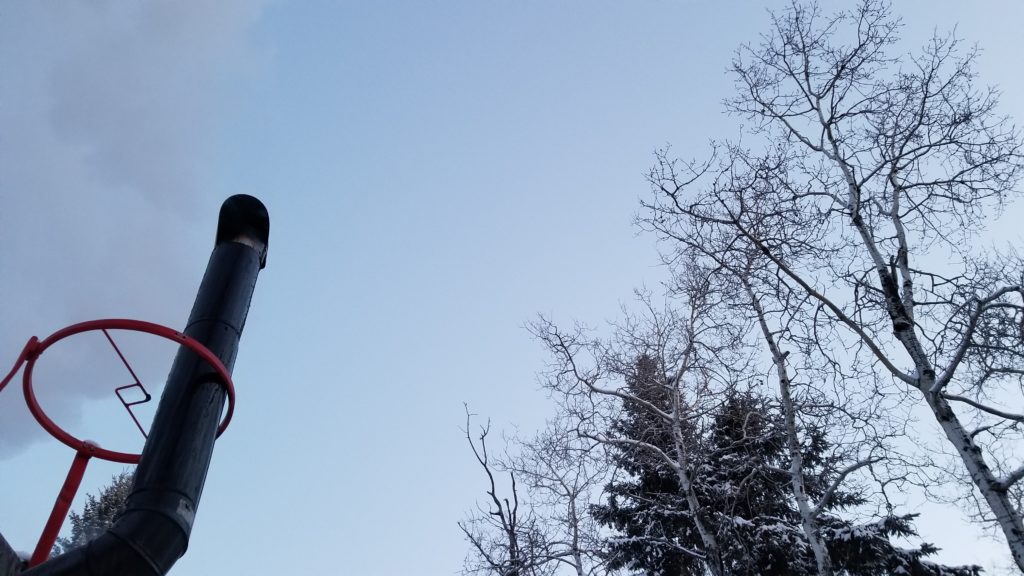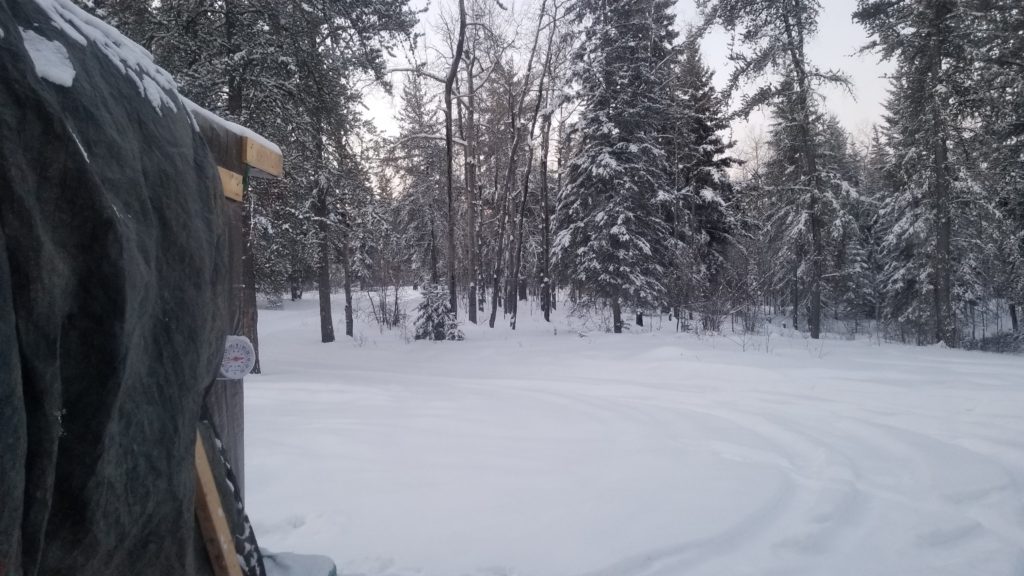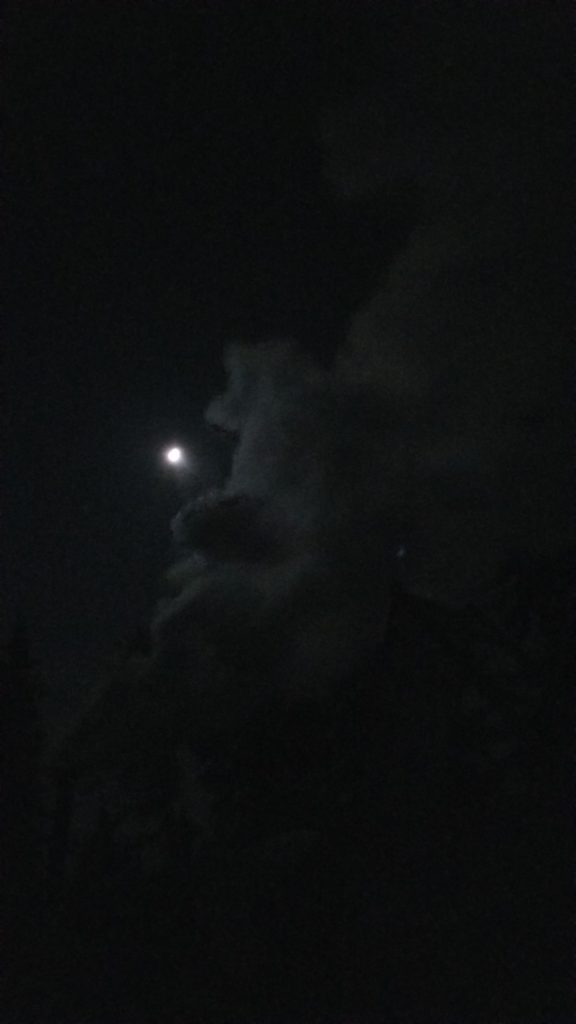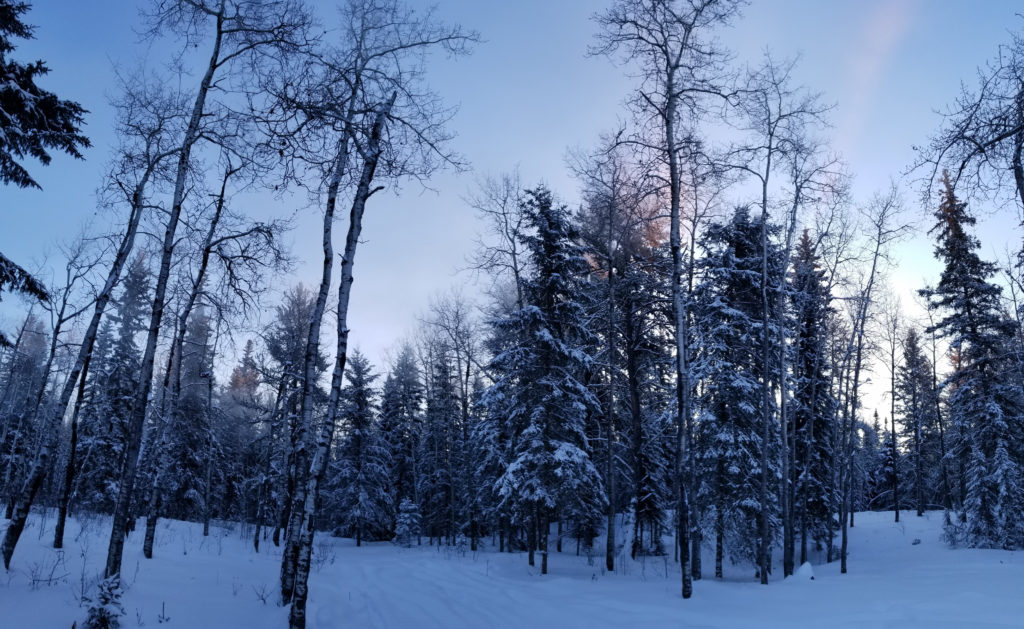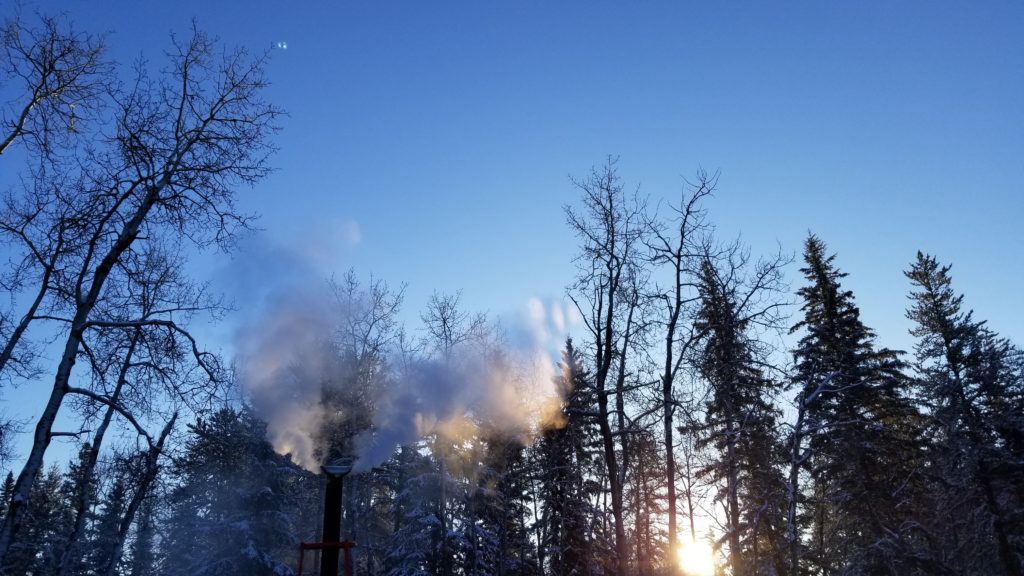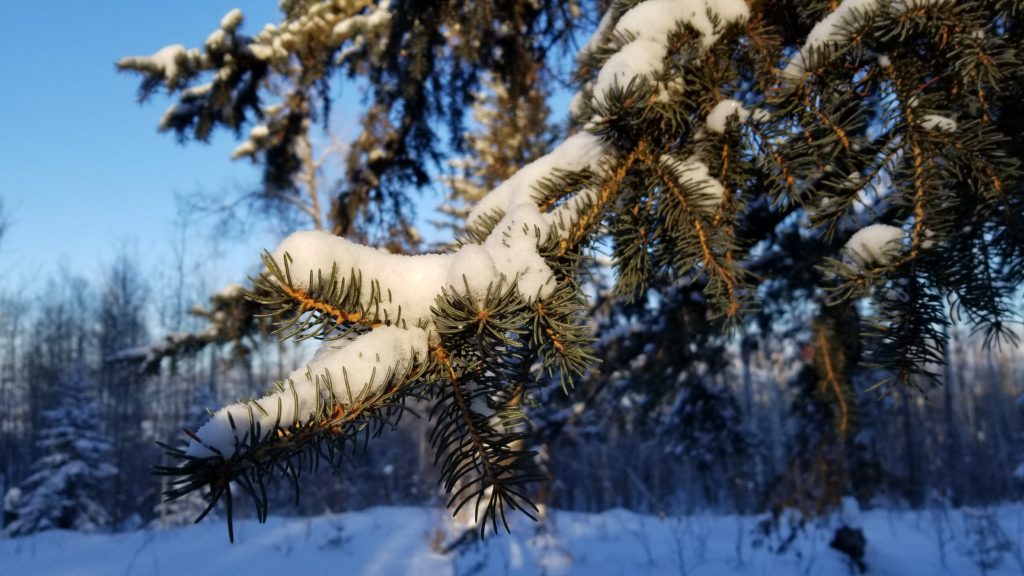all kinds of
wonderful unknowables
There are so many things in life that remain a mystery.
As the sun rose after a bright moonlit night I kept working inside and missed the marvel of the sunrise through the trees.
Winter though provides little light above the trees, so even when I was able to emerge, this caught my eye. I moved easily to get my camera for this was far to complex a shot than possible with a simple cell camera which I also did not have on me.
Then as I mounted the steps to go inside I noticed the light change and with a panic that only a photographer can know too well, I ran to catch the light at play before it moved to something, somewhere else.
Back outside the light returned to play, and these two of the few I took surprised me nicely.
I went back to work after adding them to my desktop slideshow.
This evening they showed up for the first time, which brought me to decide to postpone sleep until they are up for others to enjoy.
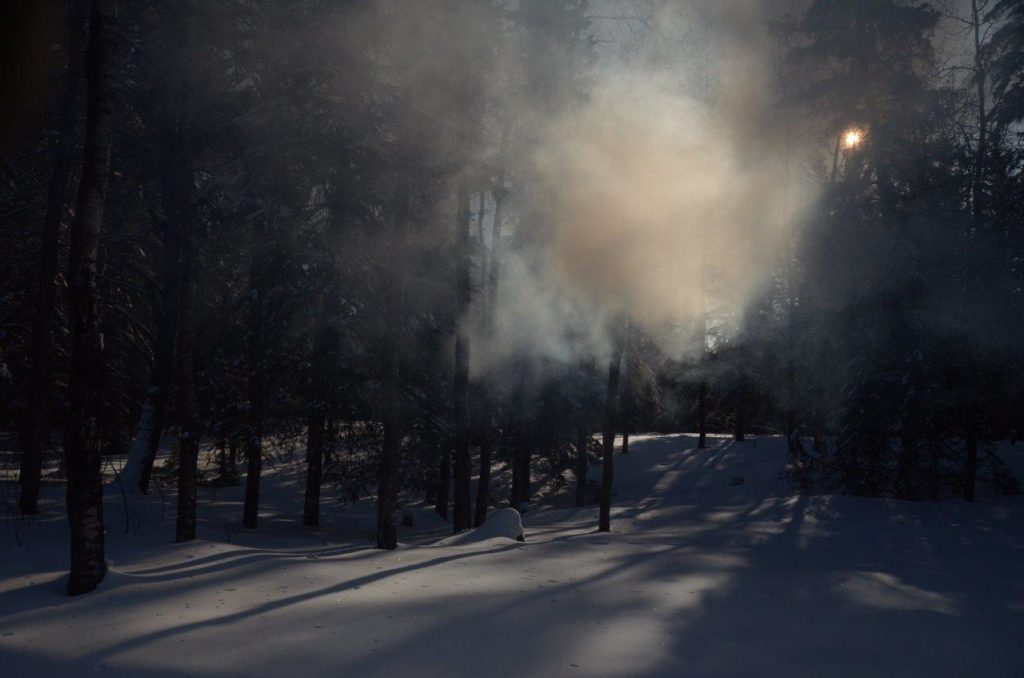
The challenge is to find the right composition and play to show what caught my eye.
Here the lines are strong, though the mystery is less if at all.
.
.
.
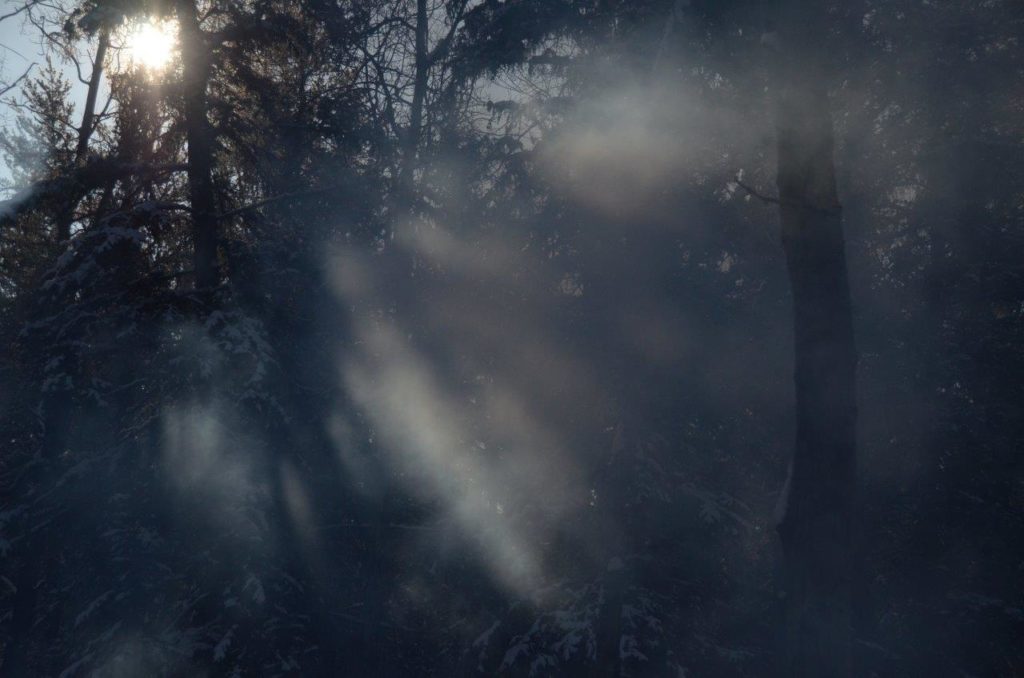
Here the mystery lays fully in the frame.
There was no fog, as one can tell with a trained eye. This is smoke from the campfire burning up some junk wood and chainsaw chips, with the temperature just right that the smoke traversed quite a ways through the trees on its way to ‘freedom’ in the atmosphere.
Small mysteries include how people can possibly not understand what Nelson Mandela and Bishop Tutu demonstrated so diligently:
It is very difficult requiring great patience and diligence to throw off oppressive, racists, unjust rulers.
But if one simply replaces them with one’s own version of oppression, racism, and injustice
then one actually only takes a step deeper into greater difficulties for which one is then responsible:
Getting rid of one’s oppressors becomes a step deeper into oppression, from which one has less likelihood of getting free of, for one has deepened the cycle of revenge … and that can take more than generations to be free of.
Mandela and Tutu demonstrated that FRFEDOM from one’s oppressors only is possible if one finds a way free from being the oppressors first, last and all the way in between, which is so much more difficult than throwing off one’s oppressors!
Another small mystery is how it is that so many people think that their lies which ruin other people, are not seen as lies, and that there are terrible consequences, natural consequences and God wrought consequences for such injustice. Even people entrusted with great authority, or perhaps most of all, people entrusted with great authority seem to be oblivious to their own lie’s baldfaceness, and the unjust consequences to other people far beyond the persons they lie about, and the ruinous consequences to themselves. Lies rot a person from the inside until there is nothing left inside, until one is physically alive, but there is no soul left.
While God punishes people for their sins, or forgives them, But unless one repents (changes 180° the sin) the sinner suffers the sin more than anyone else.
Another small mystery of life is how people can think that doing nothing about lies and injustice are even options for life.
Bringing light to bear upon lies and injustice may seem to be costly, even one’s job, or peace, or reputation … but to do nothing in the face of lies leaves one rotting inside as badly as the liars and perpetrators of injustice.
One can look a far, or not so far, just south of the border, to see how destructive lies and ignoring them, can be. But one ought also to pay attention to what is happening in one’s own town: in the politics, the power plays, the wealth thrown around and cow towed to, the public officials, elected and appointed who are entrusted with maintaining good order and justice. Of course one also needs to start in one’s own family, and with one’s self.
The mystery of life for me has been how so many people whom I’ve met are so unaware of the themselves, as they hammer others down and about to make their way forward and upward through life. It’s as if kindness we completely unknown, honesty never heard of, and fairness and justice concepts that mean whatever gets me ahead at whatever cost.
The profound mystery is how light plays on all these self-deceptions, colouring the world ugly.
Except by Grace the colouring can be also a thing of beauty as one forgives and loves despite the cruelty focused at oneself and at others.
Forgiveness is not always possible: sometimes one needs to leave the judgement to God, and move on, not forgiving and fully remembering the sins, but not condemning. The sinners suffer their sins. God eventually judges them, no spin, no evidence hidden, no witnesses excluded — God knows all with or without evidence and witnesses. And since God exists beyond time the consequences of that judgement begins at one’s birth; thus sinners suffer their sins more than are punished for them.
As an ordained person, responsible and with authority to bring forgiveness to sinners, and also entrusted with the terrible authority to bind sins for God to judge, I have seldom done other than pronounce forgiveness, until the last few years. Now the injustice that I have been the brunt of, which is not limited to just me, but most men abused by women, falsely convicted in our courts … which forces me to estimate that more than 75% of men convicted of a crime against their spouse or partner are truly innocent; so pervasive is this turn. We used to hear that men without a thread of truth could bring their non-compliant wives to jail to be ruined or to mental institutions to be drugged out of their minds for decades. Now the system has changed: and it allows women, without truth, to bring their husbands and partners to jail and mental institutions.
These sins, that make this possible, that invite women to do this, as if this deals with the real abuse of women by men, and clearly ignores the real abuse of men by these women … these sins cannot be forgiven. They are bound for God to judge.
The rest of us need to work to bring light to these injustices, or we rot just like the perpetrators.
The small mystery, or not so small mystery, is why this takes so long for us to bring the light to bear upon such blatant sin?
Those are small to immense mysteries. They are dwarfed by the real mystery.
The real mystery is faith:
This coming Sunday we read: love your enemies.
How is that even possible?
The answer is simple and elusively complex.
Just do it!
But the prerequisite is that one knows two things at least:
That one does not deserve to be loved by God, not at all.
And that God still does love you, fully and without reserve or hesitation.
And the third thing to know is that God calls us to love our enemies as God has loved us.
They may not deserve it, but we are to love them anyway.
It’s a matter of faith.
Simple.
Simply impossible.
Simply possible for the Holy Spirit through us, since God makes us saints.
